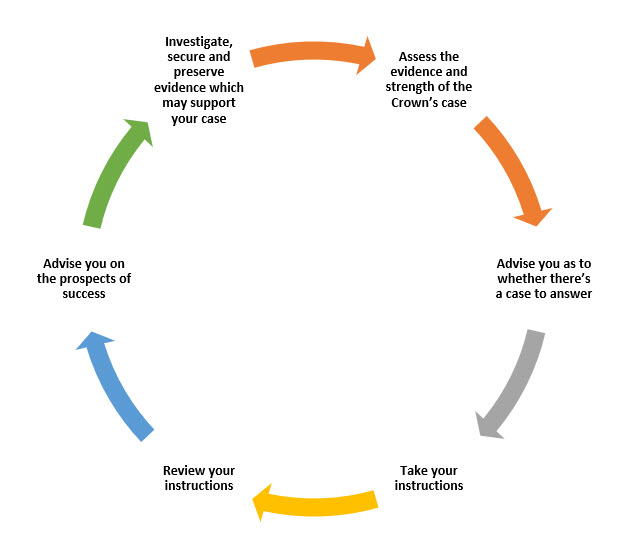If you're charged with a criminal offence then you're going to want to get the best legal representation that you can afford, from a rated criminal defence solicitor. The consequences of an adverse outcome are obvious (loss of reputation, broken personal relationships, loss of freedom, etc.) and if you instruct me I will do all that I properly can to achieve the best result for you.
But what does "all that I can" actually mean? What will I actually do for you?
Step 1 :: Assess the evidence and strength of the prosecution’s case
In all cases, I'll analyse the evidence and identify:
- Whether you have a case to answer (i.e. is there sufficient evidence upon which the triers of fact, properly directed, could convict);
- If there is a case to answer:
- The key issues you'll have to deal with in order to defend the matter;
- The likely sentence if you are convicted.
Step 2 :: Advise you as to whether there’s a case to answer
Once I've established whether there is a case to answer, I'll advise you of this, carefully explaining the law and the evidence the prosecution will use to prove its case. At this stage I'll also explain the likely consequences of a conviction.
Step 3 :: Take your instructions
Once I am satisfied that you understand the law as it applies to your case and you're aware how the prosecution will use their evidence to prove its case, I'll be in a position to take your instructions. This involves:
- Obtaining background antecedent information about you;
- Obtaining your response to the prosecution’s allegations;
- Obtaining your comments on the key issues identified as part of Step 1.
Step 4 :: Review your instructions
Once I've taken your instructions I'll need to consider further what could undermine the respective prosecution and defence cases.
I'll assess the relative strengths and weaknesses of the prosecution and defence cases, having in mind not only the defence that you may wish to pursue but also any others that may be available.
Step 6 :: Investigate, secure and preserve evidence which may support your case
Cases fall into different categories, depending upon their seriousness and complexity:
- There are simple pleas of not guilty where there is only one issue and no other material will assist;
- There are other, much more complex investigations which involve a multiplicity of issues and potential lines of inquiry; or
- You may be pleading guilty but there may be information that can be used to support your mitigation to the court.
Regardless, in all cases in order to ensure quality and consistency of defence I'll carry our further steps to properly and proactively defend you. This will include:
- A consideration of the situation that confronts you and the information currently available;
- A consideration of the information you need to support your case, and how this might be obtained;
- Actually going out and getting the information I've identified;
- Recording and / or storing the information I've gathered;
- Analysing my updated information base; and
- Repeating Step 5 if appropriate and reappraising the situation.
As I receive a new piece of information, I'll run through the steps outlined above.

